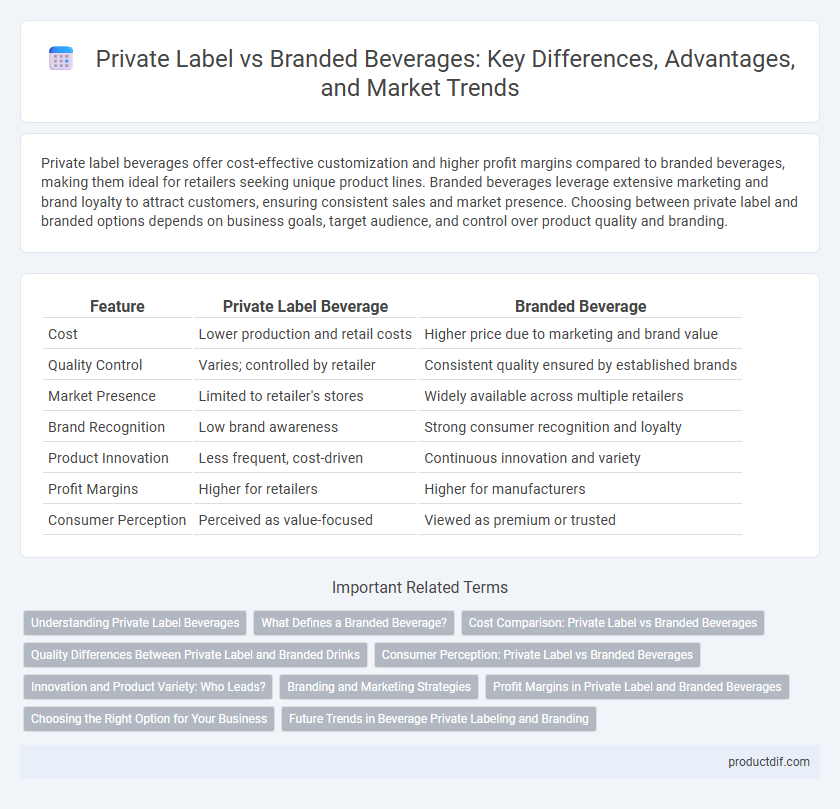Private label beverages offer cost-effective customization and higher profit margins compared to branded beverages, making them ideal for retailers seeking unique product lines. Branded beverages leverage extensive marketing and brand loyalty to attract customers, ensuring consistent sales and market presence. Choosing between private label and branded options depends on business goals, target audience, and control over product quality and branding.
Table of Comparison
| Feature | Private Label Beverage | Branded Beverage |
|---|---|---|
| Cost | Lower production and retail costs | Higher price due to marketing and brand value |
| Quality Control | Varies; controlled by retailer | Consistent quality ensured by established brands |
| Market Presence | Limited to retailer's stores | Widely available across multiple retailers |
| Brand Recognition | Low brand awareness | Strong consumer recognition and loyalty |
| Product Innovation | Less frequent, cost-driven | Continuous innovation and variety |
| Profit Margins | Higher for retailers | Higher for manufacturers |
| Consumer Perception | Perceived as value-focused | Viewed as premium or trusted |
Understanding Private Label Beverages
Private label beverages refer to products manufactured by one company but sold under another company's brand, often retailers or wholesalers. These beverages offer cost advantages and allow retailers to control product quality, packaging, and pricing strategies, differentiating them from branded beverages that rely heavily on established brand equity. Understanding private label beverages involves recognizing their role in increasing market share and meeting consumer demand for affordable alternatives without compromising on quality.
What Defines a Branded Beverage?
A branded beverage is defined by its strong brand identity, consistent quality, and extensive marketing efforts that create consumer recognition and loyalty. It typically involves proprietary recipes, unique packaging, and a clear value proposition that distinguishes it from generic or private label options. Branded beverages often command premium pricing due to perceived quality and brand trust established through sustained advertising and distribution channels.
Cost Comparison: Private Label vs Branded Beverages
Private label beverages typically incur lower production and marketing costs compared to branded beverages, resulting in more competitive retail prices for consumers. Branded beverages often spend significantly on advertising, brand development, and premium packaging, which increases their overall cost. Retailers benefit from private label beverages by achieving higher profit margins due to reduced intermediary expenses and supply chain efficiencies.
Quality Differences Between Private Label and Branded Drinks
Private label beverages often prioritize cost-efficiency, which can lead to variations in ingredient quality compared to branded drinks that invest heavily in premium sourcing and consistent formulations. Branded beverages typically undergo rigorous quality control and flavor testing to ensure uniform taste and safety standards across batches. Consumer perception frequently associates branded beverages with higher reliability and innovative recipes, while private label products focus on providing value-driven alternatives without compromising baseline safety.
Consumer Perception: Private Label vs Branded Beverages
Consumers often perceive branded beverages as higher quality and more trustworthy due to established brand reputation and marketing efforts. Private label beverages, however, are increasingly recognized for offering comparable quality at lower prices, appealing to cost-conscious shoppers. Shopper surveys indicate a growing willingness to try private label options, especially when packaging and taste ratings align closely with branded counterparts.
Innovation and Product Variety: Who Leads?
Private label beverages often lead in product variety by offering tailored options that meet niche consumer preferences, leveraging flexible manufacturing partnerships to quickly innovate new flavors and formulations. Branded beverages maintain an edge in innovation through substantial R&D investments, strong brand loyalty, and the ability to launch cutting-edge functional ingredients or patented technologies. Market analysis reveals that private labels dominate in rapid response to trends, while branded products excel in sustained innovation and premium product development.
Branding and Marketing Strategies
Private label beverages leverage cost-effective production and flexible branding, allowing retailers to customize packaging and target niche markets with tailored marketing campaigns. Branded beverages invest heavily in brand equity, utilizing extensive advertising, sponsorships, and influencer partnerships to build consumer loyalty and premium perception. Strategic differentiation in private label and branded beverage marketing hinges on balancing price competitiveness with distinct brand storytelling to capture diverse consumer segments.
Profit Margins in Private Label and Branded Beverages
Private label beverages typically offer higher profit margins than branded beverages due to lower marketing and distribution costs, enabling retailers to capture more value per unit sold. Branded beverages often incur significant expenses in brand development, advertising, and promotional activities, which can reduce overall profitability despite higher retail prices. Retailers favor private labels for their ability to enhance margin control and improve customer loyalty through exclusive product offerings.
Choosing the Right Option for Your Business
Choosing between private label and branded beverages depends on your business goals, target market, and control over product quality. Private label beverages offer higher profit margins and flexibility in branding but require significant investment in production and marketing. Branded beverages provide established consumer trust and extensive distribution networks, reducing market entry risk and enhancing brand visibility.
Future Trends in Beverage Private Labeling and Branding
The future of beverage private labeling is driven by increased consumer demand for customization, sustainable packaging, and niche flavors, offering brands the flexibility to quickly adapt to market trends. Branded beverages continue to leverage strong brand loyalty and extensive marketing to maintain premium positioning, but emerging technologies like AI-driven product development are blurring the lines between private label agility and branded innovation. Sustainable sourcing and health-conscious formulations remain critical drivers shaping private label strategies, enabling retailers to compete with established brands through tailored, transparent product offerings.
Private Label vs Branded Beverage Infographic

 productdif.com
productdif.com